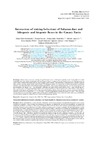Identificador persistente para citar o vincular este elemento:
https://accedacris.ulpgc.es/jspui/handle/10553/55830
| Título: | Interaction of sinking behaviour of Saharan dust and lithogenic and biogenic fluxes in the Canary Basin | Otros títulos: | Interacción sedimentaria del polvo sahariano, y los flujos biogénicos y litogénicos en la cuenca oceánica de Canarias | Autores/as: | Báez-Hernández, Maite García, Noemí Menéndez González, Inmaculada Jaramillo, Alfredo Sánchez-Pérez, Isora Santana del Pino, Ángelo Alonso Bilbao, Ignacio Mangas Viñuela, José Hernández León, Santiago Manuel |
Clasificación UNESCO: | 250618 Sedimentología 250607 Geomorfología 120903 Análisis de datos |
Palabras clave: | Lithogenic flux Biogenic flux POC flux TEP Image analysis, et al. |
Fecha de publicación: | 2019 | Publicación seriada: | Scientia Marina | Resumen: | Saharan dust events are currently the predominant source of lithogenic particles in the Canary Basin. In order to quantify this input and its relationship with the biogenic fluxes, a sediment trap was deployed in a free-drifting system at 150 m depth, 50 km off the north coast of Gran Canaria (Canary Islands). The mineralogy of the lithogenic particles included illite, calcite, hematite quartz, barite and kaolinite. The biogenic matter was composed of chitin, transparent exopolymer particles, and carbonates from foraminifera and gastropod shells. The average Saharan dust flux over the ocean surface was approximately 5±4 mg m–2 day-1. The lithogenic, carbonate and chitin fluxes were 0.8±0.6, 6.0±7.4 and 154±386 mg m–2 day-1, respectively. A fairly strong Saharan dust event during sampling was observed in the trap, with a delay of three days in the peaks of lithogenic and biogenic fluxes. The theoretical settling velocity of the lithogenic particles associated with Saharan dust events at 150 m depth was vStokes=275 m day-1, and the experimental settling was about 50 m day-1. The associated sinking behaviour of particulate organic carbon and biogenic and lithogenic fluxes observed in this study may contribute to a more realistic prediction of these fluxes in carbon biological pump models. | URI: | https://accedacris.ulpgc.es/handle/10553/55830 | ISSN: | 1886-8134 | DOI: | 10.3989/scimar.04877.19A | Fuente: | Scientia Marina [ISSN 0214-8358], v. 83 (2), p. 121-132, (Junio 2019) |
| Colección: | Artículos |
Citas SCOPUSTM
3
actualizado el 08-jun-2025
Citas de WEB OF SCIENCETM
Citations
3
actualizado el 01-mar-2026
Visitas
310
actualizado el 15-ene-2026
Descargas
154
actualizado el 15-ene-2026
Google ScholarTM
Verifica
Altmetric
Comparte
Exporta metadatos
Los elementos en ULPGC accedaCRIS están protegidos por derechos de autor con todos los derechos reservados, a menos que se indique lo contrario.
